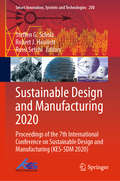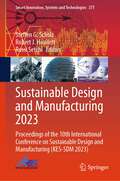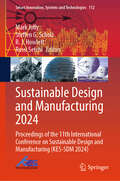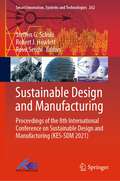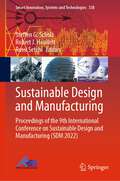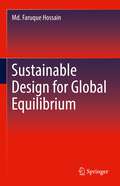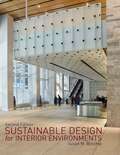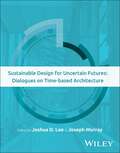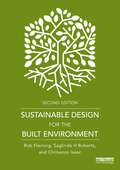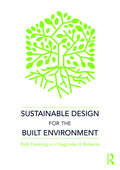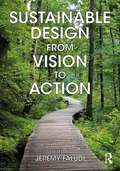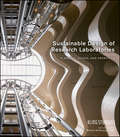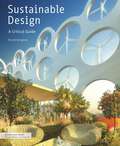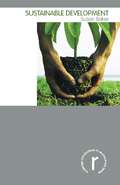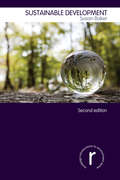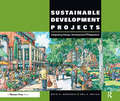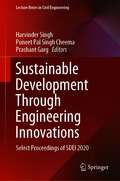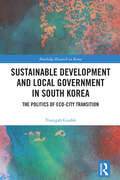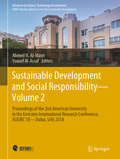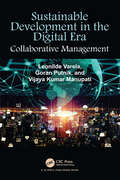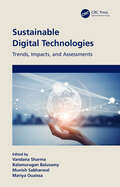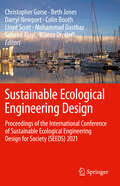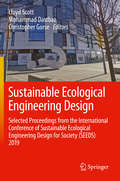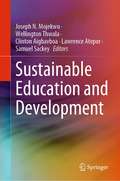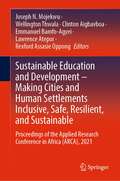- Table View
- List View
Sustainable Design and Manufacturing 2020: Proceedings of the 7th International Conference on Sustainable Design and Manufacturing (KES-SDM 2020) (Smart Innovation, Systems and Technologies #200)
by Robert J. Howlett Rossi Setchi Steffen G. ScholzThis book consists of peer-reviewed papers, presented at the International Conference on Sustainable Design and Manufacturing (SDM 2020). Leading-edge research into sustainable design and manufacturing aims to enable the manufacturing industry to grow by adopting more advanced technologies and at the same time improve its sustainability by reducing its environmental impact. Relevant themes and topics include sustainable design, innovation and services; sustainable manufacturing processes and technology; sustainable manufacturing systems and enterprises; and decision support for sustainability. Application areas are wide and varied. The book provides an excellent overview of the latest developments in the sustainable design and manufacturing areas.
Sustainable Design and Manufacturing 2023: Proceedings of the 10th International Conference on Sustainable Design and Manufacturing (KES-SDM 2023) (Smart Innovation, Systems and Technologies #377)
by Robert J. Howlett Rossi Setchi Steffen G. ScholzThe book consists of peer-reviewed papers presented at the International Conference on Sustainable Design and Manufacturing (SDM 2023). Leading-edge research into sustainable design and manufacturing aims to enable the manufacturing industry to grow by adopting more advanced technologies and at the same time improve its sustainability by reducing its environmental impact. Relevant themes and topics include sustainable design, innovation and services; sustainable manufacturing processes and technology; sustainable manufacturing systems and enterprises; decision support for sustainability; and Industry 4.0 and Intelligent Manufacturing. Application areas are wide and varied. The book provides an excellent overview of the latest developments in the sustainable design and manufacturing area.
Sustainable Design and Manufacturing 2024: Proceedings of the 11th International Conference on Sustainable Design and Manufacturing (KES-SDM 2024) (Smart Innovation, Systems and Technologies #112)
by Mark Jolly Rossi Setchi Steffen G. Scholz R J HowlettThe book consists of peer-reviewed papers presented at the International Conference on Sustainable Design and Manufacturing (SDM 2024). Leading-edge research into sustainable design and manufacturing aims to enable the manufacturing industry to grow by adopting more advanced technologies and at the same time improve its sustainability by reducing its environmental impact. Relevant themes and topics include sustainable design, innovation and services; sustainable manufacturing processes and technology; sustainable manufacturing systems and enterprises; decision support for sustainability; and Industry 4.0 and Intelligent Manufacturing. Application areas are wide and varied. The book provides an excellent overview of the latest developments in the sustainable design and manufacturing area.
Sustainable Design and Manufacturing: Proceedings of the 8th International Conference on Sustainable Design and Manufacturing (KES-SDM 2021) (Smart Innovation, Systems and Technologies #262)
by Robert J. Howlett Rossi Setchi Steffen G. ScholzThis book consists of peer-reviewed papers, presented at the International Conference on Sustainable Design and Manufacturing (SDM 2021). Leading-edge research into sustainable design and manufacturing aims to enable the manufacturing industry to grow by adopting more advanced technologies and at the same time improve its sustainability by reducing its environmental impact. Relevant themes and topics include sustainable design, innovation and services; sustainable manufacturing processes and technology; sustainable manufacturing systems and enterprises; and decision support for sustainability. Application areas are wide and varied. The book will provide an excellent overview of the latest developments in the sustainable design and manufacturing area.
Sustainable Design and Manufacturing: Proceedings of the 9th International Conference on Sustainable Design and Manufacturing (SDM 2022) (Smart Innovation, Systems and Technologies #338)
by Robert J. Howlett Rossi Setchi Steffen G. ScholzThe book consists of peer-reviewed papers presented at the International Conference on Sustainable Design and Manufacturing (SDM 2022). Leading-edge research into sustainable design and manufacturing aims to enable the manufacturing industry to grow by adopting more advanced technologies and at the same time improve its sustainability by reducing its environmental impact. Relevant themes and topics include sustainable design, innovation and services; sustainable manufacturing processes and technology; sustainable manufacturing systems and enterprises; and decision support for sustainability. Application areas are wide and varied. The book provides an excellent overview of the latest developments in the sustainable design and manufacturing area.
Sustainable Design for Global Equilibrium
by Md. Faruque HossainThis book focuses on holistic approaches of applying sustainable practices in all sectors of building, infrastructure, and energy to achieve a best-balanced global energy, building, infrastructure, transportation, and water technology (EBITW) regime. It presents a series of solutions based on innovative research and applications for building a sustainable Earth for future generations. The goal of this book is to define the context of instigation for thinking through the scientific theories and practical applications of sustainability mechanisms to confirm a global equilibrium by the implementation of the following main practices: Sustainable Energy, Sustainable Architectural and Engineering Design Technology, Sustainable Environment and Society, and Sustainable Earth.
Sustainable Design for Interior Environments
by Susan M. WinchipSustainable Design for Interior Environments, 2nd Edition, builds on the first edition's premise that the interior design profession has a social and moral responsibility to protect the health, safety, and welfare of people and the environment. The text equips professors, students, and practitioners to design sustainable interiors by addressing LEED certification, environmental concerns, ecosystems, ethics, values, worldviews, and the ways in which science and technology can be used to address environmental challenges. Through content, organization, and pedagogical features, the book integrates complex sustainability topics directly into the design process, thereby enabling readers to apply the concepts of sustainability with the same ease as they do the elements and principles of design.
Sustainable Design for Uncertain Futures: Dialogues on Time-based Architecture
by Joseph Murray Joshua D. LeeExplore pivotal intersections and themes between strategies for buildings and cities to adapt to shifting circumstances. Sustainable Design for Uncertain Futures introduces fourteen time-based strategies in architecture through a series of dialogues between experts. This format embraces a dynamic exploration of strategies ranging from Adaptive Reuse to Bio Design, revealing how each one addresses forces of change and adds adaptive capacity to the built environment. The book’s structure invites readers to engage with these strategies on multiple levels. Each chapter begins with a framing of the fundamentals, providing context and key examples to situate the strategies in the wider field. At the core of each chapter is a moderated dialogue that offers key insights into how these strategies work in practice and how they can be used in combination. By presenting these strategies through dialogue, the editors demonstrate the collaborative thinking needed to address growing uncertainty in the built environment and provide readers with an actionable framework of technical and management approaches. The book’s practical focus helps bridge the gap between theory and application, making this edited volume an invaluable resource for both academics and practitioners. Readers will find dialogues involving fifteen renowned experts in their respective fields: Avi Friedman & Naomi Keena (Mass Customization) ↔ Michael Fox (Computationally Responsive Environments) / Bie Plevoets (Adaptive Reuse) ↔ John Dale (Open Building) / Aki Ishida (Metabolism) ↔ Michelle Laboy (Persistence) / Felix Heisel (Circular Construction) ↔ Jenni Minner (Preservation) / Kim Trogal (Repair) ↔ Brad Guy (Design for Disassembly & Adaptability) / Sarah Wigglesworth (Inclusive Design) ↔ Irena Bauman (Resilience) / Doris Sung (Smart Materials) ↔ Mitchell Joachim (Bio Design) Sustainable Design for Uncertain Futures presents: The fundamentals of each strategy, along with a short summary of each with its affordances and challenges and a few key examplesThe editors’ theory of primary time signatures, enabling readers to see and plan the combination of different time-based strategies to increase building lifecycle coverage for adaptive capacityCritical insights from thought leaders across a wide spectrum of approaches to sustainability Academics, practitioners, and others interested in change in the built environment can use the strategies discussed in Sustainable Design for Uncertain Futures to develop architectural solutions that accommodate climate change, shifting demographics, new live-work patterns, and many other uncertainties.
Sustainable Design for the Built Environment
by Rob Fleming Saglinda H Roberts Chitsanzo IsaacSustainable Design for the Built Environment marks the transition of sustainable design from a specialty service to the mainstream approach for creating a healthy and resilient built environment. This groundbreaking and transformative textbook introduces sustainable design in a clear, concise, easy-to-read format.This new edition includes fully updated exercises and online resources, an increased focus on diversity, equity, and inclusion in design, more international examples, perspectives, and approaches, enhanced full colour visuals, and additional resources for further study. The book takes the reader deep into the foundations of sustainable design, and creates a holistic and integrative approach addressing the social, cultural, ecological, and aesthetic aspects in addition to the typical performance-driven goals. The first section of this book is thematically structured around the origins, principles, and frameworks of sustainable design, aimed at inspiring a deeper, broader, and more inclusive view of sustainability. The second section examines strategies such as biophilia and biomimicry, adaptation and resilience, and health and well-being, including recent developments following the COVID-19 pandemic. The third section examines the application of sustainability principles from the global, urban, district and site, building, and human scales, illustrating how a systems thinking approach allows sustainable design to span varied contexts and multiple scales.This textbook is intended to inspire a new vision for the future that unites human activity with natural processes to form a regenerative, coevolutionary model for sustainable design. Supported by additional resources including additional reading for each chapter and classroom assignments, this book will be essential reading for students of sustainability and sustainable design.
Sustainable Design for the Built Environment
by Rob Fleming Saglinda H RobertsSustainable Design for the Built Environment marks the transition of sustainable design from a specialty service to the mainstream approach for creating a healthy and resilient built environment. This groundbreaking and transformative approach introduces sustainable design in a clear, concise, easy-to-read format. This book takes the reader deep into the foundations of sustainable design, and creates a holistic and integrative approach addressing the social, cultural, ecological, and aesthetic aspects in addition to the typical performance-driven goals. The first section of the book is themed around the origins, principles, and frameworks of sustainable design aimed at inspiring a deeper, broader, and more inclusive view of sustainability. The second section examines strategies such as biophilia and biomimicry, adaptation and resilience, health and well-being. The third section examines the application of sustainability principles from the global, urban, district, building, and human scale, illustrating how a systems thinking approach allows sustainable design to span the context of time, space, and varied perspectives. This textbook is intended to inspire a new vision for the future that unites human activity with natural processes to form a regenerative, coevolutionary model for sustainable design. By allowing the reader an insightful look into the history, motivations, and values of sustainable design, they begin to see sustainable design, not only as a way to deliver green buildings, but as a comprehensive and transformative meta-framework that is so needed in every sector of society. Supported by extensive online resources including videos and PowerPoints for each chapter, this book will be essential reading for students of sustainability and sustainable design.
Sustainable Design from Vision to Action
by Jeremy FaludiThis book offers a comprehensive guide to the sustainable design of products, services, or related systems. It goes beyond concept explanations to provide you with practical instructions on how to apply the tools and methods to your own designs. The world is finally waking up to the necessity of sustainability, especially in the design and engineering of all the physical products that surround us every day.Sustainable Design from Vision to Action not only provides a thorough understanding of the high-level values and goals of sustainable design, but also gives readers actionable step-by-step guides for how to implement them on the ground, in daily practice. This includes quick reference tables and other resources for practical design, with lists of resources for greater depth. The activities can be used by designers and engineers, in classrooms, or in industry. This innovative textbook focuses primarily on physical product development, but also applies to services, systems, and digital products. It includes a thorough range of quantitative and qualitative methods across the whole product life cycle, including material choice, energy use, systems thinking, design for recycling, user behavior change, business models, equity and inclusion, and more. The book aims to change your design practice to help build a world that is healthy, abundant, beautiful, and fulfilling for all species, for all time.This highly illustrated text will provide an excellent introduction to sustainable design in practice for industrial design and mechanical engineering students. It will also be useful for professional designers, engineers, and managers in industry.
Sustainable Design of Research Laboratories: Planning, Design, and Operation
by KlingStubbinsArchitecture, Sustainable Design A comprehensive book on the sustainable design of research laboratories Today's research laboratories are complex and difficult building types to design, and making them sustainable adds more obstacles. Written by members of the well-known firm KlingStubbins, under the guidance of its Directors of Laboratory Planning, Engineering, and Sustainability, Sustainable Design of Research Laboratories represents a multidisciplinary approach to addressing these challenges. With the needs of architects, engineers, construction professionals, and facility owners in mind, this book provides a road map for sustainable planning, design, construction, and operations. The book is valuable both to experienced laboratory designers seeking guidance on sustainable strategies, as well as professionals versed in sustainable design who want insight into laboratory applications. With content rich in guidance on performance strategies, even the most technically oriented reader will find valuable lessons inside. This book: Focuses on the links between best sustainable practices and the specific needs of research laboratories Provides a number of case studies of the best contemporary sustainably designed labs, with a focus on architecture and engineering Explores the challenges in applying rating systems, including LEED, to laboratory buildings Examines unique considerations of sustainable approaches in leased and renovated laboratories Includes contributions by experts on approaches to integrated design, site design, programming, and commissioning This important book shows how theoretical ideas can be applied to real-life laboratory projects to create healthier and more efficient research environments.
Sustainable Design: A Critical Guide (Architecture Briefs)
by David BergmanWritten for students and practitioners in the fields of architecture and interior design, our new Architecture Brief Sustainable Design provides a concise overview of all the techniques available for reducing the energy footprint of structures and spaces. With clear, simple language and a practical "can-do" approach, author David Bergman covers everything from the profession's ethical responsibility, to design structures and spaces that sustain our natural resources, to specific considerations such as rainwater harvesting, graywater recycling, passive heating techniques, solar orientation, green roofs, wind energy, daylighting, indoor air quality, material evaluation and specification, and how to work with green building certification programs.
Sustainable Development
by Susan BakerThe promotion of sustainable development opens up the debates surrounding our relationship with the natural world, what constitutes social progress, and the character of development in the present and into the future. Answering the need for an introductory, comprehensive, yet critical book that explores the challenges involved in the implementation of sustainable development, this revealing text investigates this subject across different socio-political and economic contexts. It combines an examination of the institutional engagement with sustainable development at a global level, with an empirically informed discussion on challenges facing high consumption societies, economies in transition and third world countries in their efforts to achieve sustainable development. Recognizing that promoting sustainable development is a quintessentially global task, the book focuses on the authoritative Brundtland formulation of sustainable development and the role of the United Nations Summits in promoting this vision. The empirical focus of the book is complemented by strong conceptual discussions as sustainable development is explored as part of new efforts, albeit tentative, to integrate environmental, economic and (more recently) social considerations into a new development paradigm. Providing an accessible, up-to-date and comprehensive treatment of the issues surrounding the promotion of sustainable development, this unique, internationally-focused book combines a strong conceptual analysis, with wide ranging empirical focus and a wealth of case material. Including summary points and suggestions for further reading, as well as web resources and an extensive bibliography, it is ideal for students, scholars and researchers in the fields of environmental sciences, politics, sociology and development studies.
Sustainable Development (Routledge Introductions to Environment: Environment and Society Texts)
by Susan BakerThe current focus on sustainable development opens up debates surrounding our relationship with the natural world, about what constitutes social progress and about the character of development, both in the Global North and the Global South. The promotion of sustainable futures is taking on a new urgency in the context of climate change and biodiversity loss. This concise and accessible text explores how the international community is responding to the challenge of sustainable development. It also investigates the prospect for, and barriers to, the promotion of sustainable development in high-consumption societies of the industrialised world, from the USA and the EU to the economies of transition in Eastern and Southern Asia. In Sustainable Development Baker considers the global impact of China’s industrial boom as well as how Chinese investments are shaping the prospects for sustainable development on the African continent. This global coverage is balanced by investigating how local action, ranging from the transition towns movement in the UK to the Green Belt movement in Kenya, can contribute to the pursuit of sustainable development. The second edition has been extensively revised and updated and benefits from the addition of three new chapters: sustainable development in China; the governance of sustainable development; and sustainable production and consumption. Climate change and biodiversity management have also been expanded into full chapters. Providing an up-to-date and comprehensive treatment of the issues surrounding the promotion of sustainable development, this unique, internationally-focused book combines a strong conceptual analysis with wide ranging empirical focus and a wealth of case material. Including summary points and suggestions for further reading, as well as web resources and an extensive bibliography, it is ideal for students, scholars and researchers in the fields of environmental sciences, politics, geography, sociology and development studies.
Sustainable Development Projects: Integrated Design, Development, and Regulation
by David R. Godschalk Emil E. MaliziaDevelopment projects are the building blocks of urban growth. Put enough of the right projects together in the right way, and you have sustainable cities. But getting the pieces to stack up takes a feat of coordination and cooperation. In our market economy, developers, designers, and planners tend to operate in silos, each focused on its own piece of the puzzle. Sustainable Development Projects shows how these three groups can work together to build stronger cities. It starts with a blueprint for a development triad that balances sound economics, quality design, and the public good. A step-by-step description of the development process explains how and when planners can most effectively regulate new projects, while a glossary of real estate terms gives all the project participants a common language. Detailed scenarios apply the book’s principles to a trio of projects: rental apartments, greenfield housing, and mixed use infill. Readers can follow the projects from inception to finished product and see how different choices would result in different outcomes. This nuts-and-bolts guide urges planners, developers, and designers to break out of their silos and join forces to build more sustainable communities. It’s essential reading for practicing planners, real estate and design professionals, planning and zoning commissioners, elected officials, planning students, and everyone who cares about the future of cities.
Sustainable Development Through Engineering Innovations: Select Proceedings of SDEI 2020 (Lecture Notes in Civil Engineering #113)
by Harvinder Singh Prashant Garg Puneet Pal Singh CheemaThis book comprises select peer-reviewed papers presented at the International Conference on Sustainable Development through Engineering Innovations (SDEI) 2020. It presents recent advances, new directions, and opportunities for sustainable and resilient approaches to design and protect the built-environment through engineering innovations & interventions. The topics covered are highly diverse and include all civil engineering and construction-related aspects such as construction and environmental Issues, durability and survivability under extreme conditions, design of new materials for sustainability, eco-efficient and ultra-high performance cementitious materials, embedded structural and foundation systems and environmental geomechanics. The book will be of potential interest to the researchers and students in the fields of civil engineering, architecture and sustainable development.
Sustainable Development and Local Government in South Korea: The Politics of Eco-city Transition (Routledge Research on Korea)
by Youngah GuahkThis book addresses one of the key issues of our time, the process of sustainable transition in modern, industrial societies, by looking at the dynamics associated with this objective at the decentralised local level in South Korea.The creation of eco-cities is a crucial aspect in the ongoing urbanisation of East Asia, and this book investigates specific examples of Korean local governments embarking on the path towards sustainable urban development and assesses their achievements. Making use of a wide range of sources and data collection methods, the book studies two diverse cases in great depth: Suwon City and Jeju Province. By systematically comparing the aims, strategies and decision-making processes in these two examples, the book illuminates the relative roles played by local leaders, central government, civil society representatives, and even international organisations.Highlighting the challenges, driving forces and limitations impacting sustainable transition at the local level, this book will be a valuable resource to students and scholars of Korean politics, decentralisation, urban governance, sustainable development and city planning.
Sustainable Development and Social Responsibility—Volume 2: Proceedings of the 2nd American University in the Emirates International Research Conference, AUEIRC'18—Dubai, UAE 2018 (Advances in Science, Technology & Innovation)
by Ahmed N. Al-Masri Yousef Al-AssafThis book gathers high-quality research papers presented at the 2nd AUE international research conference, AUEIRC 2018, which was organized by the American University in the Emirates, Dubai, and held on November 13th-15th, 2018. The book is broadly divided into two main sections: Sustainability and Smart Business, and Sustainability and Creative Industries. The broad range of topics covered under these sections includes: risk assessment in agriculture, corporate social responsibility and the role of intermediaries, the impact of privatizing health insurance, political events and their effect on foreign currency exchange, the effect of sustainable HR practices on financial performance, sustainability integration in the supply chain and logistics, gender inequality in the MENA economies, the panel data model, the model of sustainable marketing in the era of Industry 4.0, micro-enterprises as a tool for combating unemployment, the impact of financial education and control on financial behavior, measuring financial and asset performance in agricultural firms, a comprehensive strategic approach to sustainability in the UAE, sustainability and project finance, HR analytics, FaD or fashion for organizational sustainability, a conceptual framework of sustainable competitive advantages, psychology of organizational sustainability, Blockchain technology and sustainability, veganism and sustainability, institution building from an emotional intelligence perspective, sustainable concrete production using CWP, occupants’ behavior and energy usage in Emirati houses, the effect of shop lighting on consumer behavior, multimedia applications in digital transformation art, integrating biomimicry principles in sustainable architecture, experimental sustainable practices in fashion education, technology-assisted student-centered learning for civil engineering, and a 10-step design process for architectural design studios. All contributions present high-quality original research work, findings and lessons learned in practical development.
Sustainable Development in the Digital Era: Collaborative Management
by Leonilde Varela Goran Putnik Manupati Vijaya KumarCollaborative manufacturing and management are a fundamental requirement in today’s digital age, to enable an innovative and sustainable development of companies. This is possible and highly recommended not just in the context of traditional companies, but further in cyber physical systems and in the context of extended, distributed, networked and virtual organizations.The book provides fundamental methodologies, models, methods, tools, and platforms about collaborative engineering, to support manufacturing and management processes and practices, aligned with the current requirements underlying Industry 4.0, and Society 5.0. It describes the application of collaborative management paradigms, about dynamic, distributed, integrated, intelligent, predictive, parallel, and real-time based approaches and tools to enable collaborating entities, including suppliers, business partners and other stakeholders, to develop projects and solve problems that are becoming increasingly more complex and challenging currently. Such collaborative processes and practices require companies and underlying stakeholders to be connected, and to further communicate, and share data, problems, and expertise, and other kind of resources, along with concerns, difficulties, and challenges, requiring co-learning, and the co-creation of knowledge, processes, methods, and systems to interactively support projects and problem solving.The book reviews the advances and provides case studies to assist scientists, practitioners and students in high standard manufacturing management processes and practices, to properly handle daily problems and challenges, with a special focus on the use of recent paradigms and tools to support manufacturing management decision making, through innovative methodologies and approaches for permitting researchers to learn, develop further work, and become advanced practitioners and promoters of collaborative management.
Sustainable Digital Technologies: Trends, Impacts, and Assessments
by Vandana Sharma, Balamurugan Balusamy, Munish Sabharwal, and Mariya OuaissaThis book is a reference on digital technology and its impact on sustainability, providing insight into sustainable practices globally. It focuses on the critical practices leading to sustainable initiatives among various organizations, IT infrastructure, communities, and government compliance. The book describes the green computing paradigms and the impact of a circular economy with a focus on sustainable practices in a post-pandemic world. Sustainable Digital Technologies: Trends, Impacts, and Assessments discusses the critical factors leading to sustainable initiatives in a global economy. It highlights the impact of digital technology and Industry 4.0 in today’s world. The book focuses on the role, responsibility, and the effect of the Internet of Things for digital sustainability and practices. It describes implementation strategies for green cloud computing and presents additional strategies for sustainable practices in a post-pandemic world. This publication is designed for use by technology development academicians, data scientists, industrial professionals, researchers, and students interested in uncovering the latest innovations in the field and the current research on problem-oriented processing techniques in sustainable and evolutionary computing applications with reduced energy channelization.
Sustainable Ecological Engineering Design: Proceedings of the International Conference of Sustainable Ecological Engineering Design for Society (SEEDS) 2021
by Beth Jones Mohammad Dastbaz Christopher Gorse Colin Booth Lloyd Scott Darryl Newport Saheed Ajayi Bianca DrotleffThe International Conference of Sustainable Ecological Engineering Design for Society (SEEDS) brings together global experts to focus on a sustainability agenda and the positive and detrimental changes that are taking place. Papers presented at the conference come from across a broad spectrum of the Sustainable Development Goals (SDGs) and bring forward practices to tackle the climate emergency and evaluate their impact. It addresses technical issues, measuring, monitoring, and assessing change, emphasizing the environment, infrastructure, and buildings, how they exist in relative isolation, and the possibilities for sustainable integration. The SEEDS Conference addresses the interdependence of people and the built and natural environments and recognizes the interdisciplinary and international themes necessary to assemble the knowledge required for positive change.
Sustainable Ecological Engineering Design: Selected Proceedings from the International Conference of Sustainable Ecological Engineering Design for Society (SEEDS) 2019
by Mohammad Dastbaz Christopher Gorse Lloyd ScottThrough research and proven practice, the aim of the International Conference of Sustainable Ecological Engineering Design for Society (SEEDS) is to foster ideas on how to reduce negative impacts on the environment while providing for the health and well-being of society. The professions and fields of research required to ensure buildings meet user demands and provide healthy enclosures are many and diverse. The SEEDS conference addresses the interdependence of people, the built and natural environments, and recognizes the interdisciplinary and international themes necessary to assemble the knowledge required for positive change.
Sustainable Education and Development
by Clinton Aigbavboa Wellington Thwala Joseph N. Mojekwu Lawrence Atepor Samuel SackeyThis book presents papers from the 9th Applied Research Conference in Africa (ARCA), showcasing the latest research on sustainable education and development. The conference is focused on applied research discussion and its dissemination, developing understanding about the role of research and researchers in the development of the continent. ARCA gathers papers which explain how key education is to transforming lives, eradicating poverty and driving sustainable development in Africa. Presenting high quality research about developing economies, construction, education and sustainability, this proceedings will be of interest to academics, postgraduate students, and industry professionals.
Sustainable Education and Development – Making Cities and Human Settlements Inclusive, Safe, Resilient, and Sustainable: Proceedings of the Applied Research Conference in Africa (ARCA), 2021
by Clinton Aigbavboa Wellington Thwala Joseph N. Mojekwu Lawrence Atepor Emmanuel Bamfo-Agyei Rexford Assasie OppongThis book presents papers from the 10th Applied Research Conference in Africa (ARCA), showcasing the latest research on education and inclusive, safe, resilient, and sustainable communities. The conference is focused on applied research discussion and its dissemination, developing understanding about the role of research and researchers in the development of the continent. Education is a key driver to transform lives, build peace, eradicate poverty and drive sustainable development in Africa. Researchers face large challenges to making a meaningful contribution to the development of Africa. It is a continent where research can at time be not viewed directly related to development. The aim of the Applied Research Conference in Africa is to provide a platform for capacity building and networking among researchers in Africa. The proceedings is focussed on applied research, its discussion and dissemination and will be if interest to researchers, professors, graduate students, policymakers and professionals in industry.
